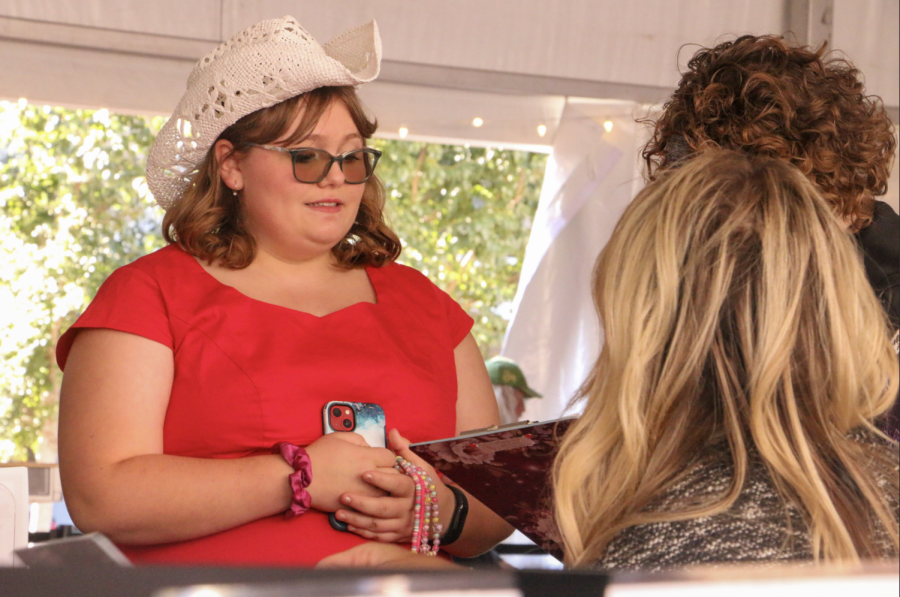Alyssa Fuhrman, Ambassadors member and senior, said individual competitions can cause nerves for her because of a variety of factors. She is in show choir and she said she has the opportunity to compete with a group a lot, but she said she only sometimes gets experience in competitive environments as an individual. Fuhrman tested her nerves and was recently in an event called Midtown’s Got Talent (MGT). This competition occurred throughout September and early October.
“(MGT) is a (singing) competition that takes place obviously in Midtown. We sent in an audition video back in September and we got an email back saying ‘Hey, you’ve been selected.’ We have done… live performances and then cuts,” she said.
Fuhrman said she has more trouble performing by herself rather than with others.
“When you’re with a group, you have other people to lean back on,” she said. “Like, ‘Oh, this note’s super high, but everyone else around is singing the same note and together, we’re going to sound good.’ But then when you’re singing by yourself, there’s a lot of pressure on you to be like, ‘Okay, every note in this song has to be perfect because I have no one else to lean on and everyone around is just going to hear me.’”
Fuhrman isn’t the only performer with this mindset. Director of choirs Kathrine Kouns said she witnesses some of her students struggling with nerves while performing, especially when they have recently made a change or have a solo.

“Sometimes (students) go on autopilot and that especially comes into play when we’re in the actual competition season and we’ve made little changes from week to week. It’s like, ‘Oh, we’re cutting that one spot,’ or, ‘We’re changing this one dance move,’ or, ‘We’re doing this new thing’ and they practice it a different way a million times and then they’ll get in there and they will just freak,” she said. “I’ve also had soloists that freak because they got the solo and they’re all excited, but then they actually get on stage, the lights are on them, it’s the real moment and the words just gone
Unlike Fuhrman, Bethany Ducat, New Edition member and senior, said her nerves didn’t affect her much because she participated in MGT more for fun rather than a title or reputation.
Ducat said, “Honestly, I enjoy performing for fun because it is freeing and peaceful. However, during MGT I was mostly just performing for fun rather than the prize because I just wanted to share my talent with the community, have a good time and try something new.”
Fuhrman said competing against her friends during MGT caused both nerves and ease at the same time.
One of my friends was in the competition with me, but it’s hard to compete against someone you’re really close with,” Fuhrman said. “It also makes it so much better because you can look down to the crowd when you’re performing and you can be like, ‘Oh, I know she’s there for me, like right there’ and so it makes it difficult, but it also makes it 10 times better.”
Kouns said she tries to emphasize preparation in hopes to decrease the level of nerves students feel.
“I think that the number-one thing (to decrease nerves) is preparation,” she said. “It is absolutely knowing it inside out, having done it a thousand times and as soon as you think you’re prepared, prepare more. Just keep drilling it over and over and over again until it is just like ingrained in who you are. Not just memorizing, but really taking apart your character, taking apart phrase by phrase, looking at every individual like aspect of the choreography or the music, so that you just know it forwards backwards inside out. And then I think the second part of it is making sure that you know how to recover if (nerves) happen and the whole concept of not showing it when there is a mistake.”
Kouns said when it comes to competitive environments with her students, she only cares about the experience, not winning or losing.
“I put absolutely zero emphasis at all on winning or losing. I truly couldn’t care less because I really care about them being like a better musician and giving a better performance than they did the previous week,” she said. “We talk a lot about how there are just so many variables in competition that you can’t control. You don’t know who your judges are necessarily, depending upon who you’re up against. Sometimes it can come down to the actual acoustic in the room and stage, so many things can come into play. Singing and show choir particularly is such a subjective thing.”
Although Fuhrman said she performs for the fun of it, she said she sometimes lets the winning and losing aspect get to her mind.
“When I perform, I get really, really nervous. So I honestly like to think of it as if it’s not a competition. It makes me feel better and then I perform better,” she said. “It’s hard not to (care about winning). It’s so hard, especially in the performance world not to compare yourself to others. So when you know that everyone else is comparing you to others and you’re in a competition mindset, you stop picking songs that are like, ‘Oh, this is the song I like best,’ and you start thinking ‘what’s going to beat these other people?’ So that’s kind of always difficult.”
Kouns said while nerves about performances and the end results may be scary, they aren’t necessarily a bad thing.
She said, “I think that a certain level of nerves is actually a good thing because it means you care. If you’re not nervous, it means you really don’t care what happens and we never want that to be the case. We always want to care about what we’re putting out there.”
















































































![Review: “The Immortal Soul Salvage Yard:” A criminally underrated poetry collection [MUSE]](https://hilite.org/wp-content/uploads/2025/03/71cju6TvqmL._AC_UF10001000_QL80_.jpg)
![Review: "Dog Man" is Unapologetically Chaotic [MUSE]](https://hilite.org/wp-content/uploads/2025/03/dogman-1200x700.jpg)
![Review: "Ne Zha 2": The WeChat family reunion I didn’t know I needed [MUSE]](https://hilite.org/wp-content/uploads/2025/03/unnamed-4.png)
![Review in Print: Maripaz Villar brings a delightfully unique style to the world of WEBTOON [MUSE]](https://hilite.org/wp-content/uploads/2023/12/maripazcover-1200x960.jpg)
![Review: “The Sword of Kaigen” is a masterpiece [MUSE]](https://hilite.org/wp-content/uploads/2023/11/Screenshot-2023-11-26-201051.png)
![Review: Gateron Oil Kings, great linear switches, okay price [MUSE]](https://hilite.org/wp-content/uploads/2023/11/Screenshot-2023-11-26-200553.png)
![Review: “A Haunting in Venice” is a significant improvement from other Agatha Christie adaptations [MUSE]](https://hilite.org/wp-content/uploads/2023/11/e7ee2938a6d422669771bce6d8088521.jpg)
![Review: A Thanksgiving story from elementary school, still just as interesting [MUSE]](https://hilite.org/wp-content/uploads/2023/11/Screenshot-2023-11-26-195514-987x1200.png)
![Review: "When I Fly Towards You", cute, uplifting youth drama [MUSE]](https://hilite.org/wp-content/uploads/2023/09/When-I-Fly-Towards-You-Chinese-drama.png)
![Postcards from Muse: Hawaii Travel Diary [MUSE]](https://hilite.org/wp-content/uploads/2023/09/My-project-1-1200x1200.jpg)
![Review: "Ladybug & Cat Noir: The Movie," departure from original show [MUSE]](https://hilite.org/wp-content/uploads/2023/09/Ladybug__Cat_Noir_-_The_Movie_poster.jpg)
![Review in Print: "Hidden Love" is the cute, uplifting drama everyone needs [MUSE]](https://hilite.org/wp-content/uploads/2023/09/hiddenlovecover-e1693597208225-1030x1200.png)
![Review in Print: "Heartstopper" is the heartwarming queer romance we all need [MUSE]](https://hilite.org/wp-content/uploads/2023/08/museheartstoppercover-1200x654.png)




